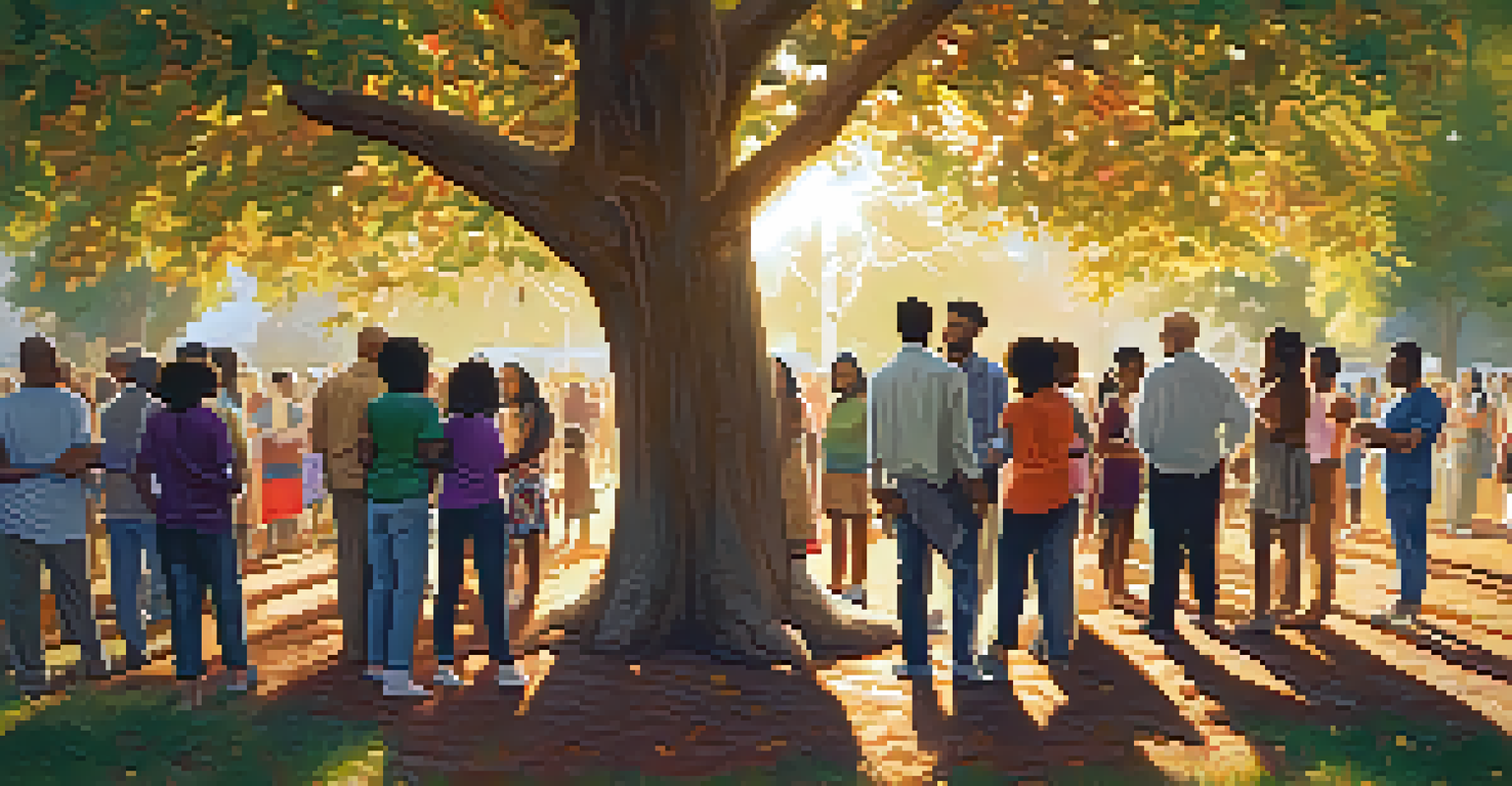Spirituality and Social Justice: Ethical Responsibilities

Understanding Spirituality and Its Core Values
Spirituality often encompasses a personal quest for meaning and connection beyond the physical world. It can include a variety of practices and beliefs, such as meditation, prayer, or engagement with nature. At its heart, spirituality emphasizes values like compassion, love, and interconnectedness, which can serve as guiding principles in our ethical responsibilities.
The ultimate aim of the ego is not to see something, but to be something.
For many, spirituality is not confined to religious traditions but encompasses a broader sense of purpose. This inclusive perspective allows individuals to draw on their unique experiences and insights, fostering a sense of community that transcends cultural and social boundaries. By embracing such values, spirituality can inspire actions that promote social justice.
Moreover, spirituality encourages us to reflect on our responsibilities toward others and the world we inhabit. It prompts us to ask profound questions about justice, equity, and the well-being of all beings. This reflection lays the groundwork for a more compassionate and just society, guiding our ethical decisions.
The Intersection of Spirituality and Social Justice
The intersection of spirituality and social justice is where the heart of ethical responsibility truly lies. Spiritual beliefs can motivate individuals to advocate for social change, emphasizing the importance of fairness and equality. Many social justice movements draw inspiration from spiritual teachings, highlighting the shared humanity among us all.

For instance, leaders like Martin Luther King Jr. integrated their spiritual convictions with social activism, demonstrating that faith can fuel the fight against injustice. This powerful combination of spirituality and action encourages people to not only dream of a better world but to take tangible steps toward making it a reality. The result is a movement that resonates deeply with individuals on both personal and communal levels.
Spirituality Inspires Social Action
Spiritual beliefs motivate individuals to advocate for social justice, fostering a sense of purpose and community.
This blending of spirituality and social justice fosters a sense of purpose, encouraging individuals to engage in activism that aligns with their values. When people feel connected to a larger mission, they are more likely to contribute to causes that promote equity and justice, illustrating the profound impact that spirituality can have on social movements.
Ethical Responsibilities in Addressing Social Issues
Ethical responsibilities arise from our understanding of spirituality and its teachings. They compel us to act against social injustices and advocate for marginalized communities. By recognizing our interconnectedness, we acknowledge that our actions—or inactions—can significantly impact others' lives.
Our lives begin to end the day we become silent about things that matter.
These responsibilities can manifest in various ways, from volunteering in local communities to supporting policies that promote social equality. Individuals can also engage in conversations that challenge systemic injustices, using their spiritual insights as a foundation. This not only raises awareness but also encourages collective action toward meaningful change.
Importantly, fulfilling these ethical responsibilities requires ongoing reflection and commitment. It’s not merely about speaking out but also about listening, learning, and growing. As we deepen our understanding of our spiritual beliefs, we can align our actions with the values we hold dear, ultimately fostering a more just society.
Practicing Compassion as a Path to Justice
Compassion lies at the heart of both spirituality and social justice, serving as a powerful catalyst for change. When we practice compassion, we cultivate empathy and understanding, allowing us to better connect with the struggles of others. This connection can motivate us to take action, whether through advocacy, volunteerism, or simple acts of kindness.
For example, responding to the needs of those facing homelessness or systemic oppression requires a compassionate approach. By understanding their experiences and challenges, we can advocate for policies that address root causes rather than just symptoms. Compassionate action not only uplifts individuals but also strengthens communities, reinforcing our shared humanity.
Compassion Fuels Activism
Practicing compassion not only connects us to the struggles of others but also drives meaningful actions toward social change.
Moreover, compassion fosters resilience among activists. It encourages us to support one another in our journeys, recognizing that the fight for social justice can be exhausting and disheartening. By cultivating a compassionate mindset, we can sustain our efforts and create a more inclusive and just world for all.
The Role of Community in Spiritual Activism
Community plays a vital role in bridging spirituality and social justice. It provides a support network for individuals engaging in activism, reminding them that they are not alone in their efforts. This sense of belonging can be incredibly empowering, fueling collective action and inspiring deeper commitments to social causes.
Communities rooted in shared spiritual values often come together to address social issues collectively. They organize events, campaigns, and discussions that promote awareness and foster solidarity. Through these actions, members not only strengthen their bonds but also amplify their impact, demonstrating the power of unity in the face of adversity.
Additionally, a community-driven approach to activism encourages diverse perspectives and experiences. This inclusivity enriches our understanding of social justice issues, allowing for more comprehensive solutions. When individuals come together in solidarity, they embody the very essence of spirituality—connecting deeply with one another and striving for a just world.
Navigating Challenges in Spiritual Activism
Spiritual activism, while noble, is not without its challenges. Activists often face obstacles such as burnout, disillusionment, or resistance from others. These hurdles can stem from the emotional toll of confronting injustice or the struggle to balance personal beliefs with societal expectations.
To navigate these challenges, it’s crucial to establish self-care practices grounded in spirituality. This might include mindfulness, meditation, or community support, allowing activists to recharge and maintain their passion. By prioritizing their well-being, they can continue their work with renewed vigor and clarity.
Community Strengthens Collective Efforts
A supportive community enhances spiritual activism by promoting solidarity and diverse perspectives in addressing social issues.
Furthermore, embracing vulnerability can foster authenticity in activism. Acknowledging our struggles and uncertainties can create a space for honest dialogue, helping to build trust within communities. By sharing our experiences, we strengthen our collective resolve and remind ourselves of the importance of compassion in the face of adversity.
The Future of Spirituality and Social Justice
As we look to the future, the relationship between spirituality and social justice is poised to grow even stronger. Increasingly, individuals are recognizing the importance of ethical responsibility in addressing social issues through a spiritual lens. This shift is reflected in emerging movements that prioritize both personal and collective well-being.
The integration of technology into activism offers new opportunities for spiritual engagement and social justice advocacy. Online platforms can facilitate connections between like-minded individuals, allowing for collaboration and the sharing of resources. This interconnectedness enables a broader reach for social justice initiatives, reinforcing the impact of spiritual activism.

Ultimately, the future holds promise for a more compassionate and equitable world. By harnessing the power of spirituality to address social injustices, we can inspire a new generation of activists committed to ethical responsibility. Together, we can cultivate a society that honors the dignity of every individual, creating lasting change rooted in love and justice.